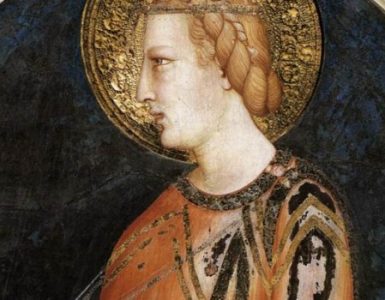
He departed and hid himself from them.
— John 12:36
In the beginning, there was brightness in Paradise. The Maker spoke familiarly with Adam and Eve, even if they did not have the Beatific Vision. They were on wonderful terms with the Almighty, but only through His limited apparitions — that is, without showing fully His divinity, as He does in Heaven. Under these circumstances, they could fail Him, and unfortunately, they did.
No sooner had Adam and Eve fallen into sin than they hid themselves from the Maker whose presence they had enjoyed up to that moment, “And they heard the sound of the Lord God walking in the garden in the cool of the day, and the man and the wife hid themselves from the presence of the Lord God among the trees of the garden” (Gen. 3:8). Significantly, it was not the Almighty who hid; our first parents did. Ronald Knox wrote:
On that miserable day when they sinned and knew that they had sinned, they hid themselves from the presence of the Lord among the trees of the Garden. They did — you see — what we are always doing: plunged themselves into the midst of creatures in order to forget their Creator. But He called them even so.
This was also true of Cain, who, after slaying Abel, had a dialogue with Yahweh, who asked him: “Where is Abel your brother?” He said, “I do not know; am I my brother’s keeper?” And the Lord said, “What have you done? The voice of your brother’s blood is crying to me from the ground” (Gen. 4:9–10). The punishment the Lord meted out to Cain was to make him a fugitive and a wanderer on earth (Gen. 4:12), which is, to some extent, the condition of man on earth after the Fall.
From the catastrophic moment of the first sin and man’s expulsion from Paradise to the present, the world has been wrapped in darkness. Man’s ancestors experienced spiritual blindness, aided only by the diminished light of reason and the sporadic light that came from the successive covenants. These lights were like shining torches in a pitch-black night.
The loss of familiarity with God ranks high among the consequences of original sin, for with the Fall, the familiar God (Deus familiaris) became the hidden God (Deus absconditus). The tragic change in the Garden of Eden was man’s own doing, not Yahweh’s. A loving and forgiving Father, He wanted to be near His creatures, but man’s misuse of freedom led to his separation from God.
Aside from this important factor that contributed to man’s state of unfamiliarity with God, what other possible reasons can God have for remaining concealed?
Our Vigilance
The Father God is veiled, and He keeps us “in suspense,” which is certainly an uncomfortable situation. But it is out of love and mercy that He does so, for this opens many opportunities for man to earn merit.
The offenses against Him, were they committed in His manifest presence, would deserve awesome punishment. It is for this reason that the saints, who had extraordinary experiences of God, were also potentially exceptional sinners.
The present dispensation is a blessing for man, for it keeps him alert. When the apostles asked Jesus about the Second Coming, He answered: “It is not for you to know times or seasons which the Father has fixed by his own authority” (Acts 1:7). The unknown time of the Second Coming kept the disciples of the Lord on their toes and begot in them an attitude of vigilance. Similarly, the “suspense” man experiences in relation to the veiled Father does him much good, for knowing neither the time nor the moment of the Lord’s coming makes him prayerful and faithful.
Discovering His Will
One instance wherein humans deeply experience the absence of a manifested Master is when we face important decisions, such as when discerning our vocation in life. We tend to ask for signs, but even in these circumstances, God remains concealed. He will not cease to be an unseen God, for He wants us to discover His will in the advice of reliable persons, in prayer, in self-knowledge, and in the events of daily life. God withdraws from sense perception so that man can exercise freedom in search of the truth.
Our Freedom
The definitive motive of the Lord’s action on our behalf is His love for us. In Sacred Scripture, the Lord manifests Himself not as an anonymous power but as a Person endowed with sentiments, who interacts with His creatures and is in no way indifferent to them.
The hidden God respects the freedom He gave us by not overwhelming us with His overt presence. Because He loves man, the Father shows Himself in the wonders of nature and through Sacred Scripture and Sacred Tradition as authentically interpreted by His Church. He does this, above all, in the person of Jesus Christ, who moved in the midst of people and called them friends.
Vatican II points out that the love of the Maker is shown in His design of creation, salvation, and redemption, and in His inviting us into His company. He wants us to share in His Trinitarian life and happiness. His coming to earth twenty-one centuries ago was not just to visit friends, but because of an ardent desire to make men sharers in His eternal life, adopted sons through the Son, “sons in the Son.”
Testing Our Faith

This article is from the book Why God Hides. Click image to learn more.
We cannot fully comprehend God’s actions, for He has told us, “My thoughts are not your thoughts, neither are your ways my ways” (Isa. 55:8).
St. Peter, the prince of apostles, tells us:
In this you rejoice, though now for a little while you may have to suffer various trials, so that the genuineness of your faith, more precious than gold which though perishable is tested by fire, may redound to praise and glory and honor at the revelation of Jesus Christ. Without having seen him you love him; though you do not now see him you believe in him and rejoice with unutterable and exalted joy (1 Pet. 1:6–8).
Pope Benedict XVI describes how we can yet glimpse God in His hiddenness:
On one side there is the silence of God and His absence, but in the Resurrection of Christ there is already an anticipation of the “yes” of God; and by this anticipation we live, and through the silence of God, we hear His word; and through the obscurity of His absence we glimpse His light.
The apostles themselves experienced both the presence and the absence of God. Peter, James, and John were flooded with supernatural light during Christ’s Transfiguration on Mount Tabor. Conversely, they went through a trial in the Sea of Galilee seemingly without the attention of Jesus:
And behold, there arose a great storm on the sea, so that the boat was being swamped by the waves; but he was asleep. And they went and woke him, saying, “Save, Lord; we are perishing.” And he said to them, “Why are you afraid, O men of little faith?” Then he rose and rebuked the winds and the sea; and there was a great calm (Matt. 8:24–26).
When we face such situations, it is possible to think God has abandoned us, but nothing could be further from reality. It is just that our faith is being tested. Such occasions prompted St. Paul to tell the first Christians of Rome: “How unsearchable are his judgments and how inscrutable his ways!” (Rom. 11:33).
Unseen Yet Near
Even though our Lord is invisible — and who has not experienced His silence? — He is not distant. The Triune God dwells in the center of the soul that enjoys His friendship.
He may not be an object of sensorial powers, but He is immanent, living and moving in creation. “God must be invisible to us,” observes Cardinal Christoph Schönborn, “so that we do not mistake Him for a bit of the world. The less He manifests Himself in a material way, the more we recognize that He stands opposite the world as its Creator.”
There is a barrier between us and the hidden God that we may not cross. Jesus told His disciples, “Where I am going you cannot come” (John 8:21). This is a result of sin, for there was no such impenetrable barrier in Paradise before the Fall. Personal sin weaves a thick veil between creatures and the Almighty and the entire supernatural world.
Yet, although He is hidden from us, God is still near. “If I ascend to heaven,” says the psalmist, “thou art there. . . . If I take the wings of the morning and dwell in the uttermost parts of the sea, even there thy hand shall lead me, and thy right hand shall hold me” (Ps. 139:8–10). He is omnipresent, particularly in the soul of His children, where He speaks in whispers: Thus, the Lord told Elijah: “ ‘Go forth and stand upon the mount before the Lord.’ And behold, the Lord passed by, and a great and strong wind rent the mountains, and broke in pieces the rocks before the Lord, but the Lord was not in the wind; and after the wind an earthquake, but the Lord was not in the earthquake; and after the earthquake a fire, but the Lord was not in the fire; and after the fire a still small voice.” (1 Kings 19:11–12).
St. Josemaría Escrivá, the founder of Opus Dei, affirmed:
The God of our faith is not a distant being who contemplates indifferently the fate of men: their desires, their struggles, and their sufferings. He is a Father who loves His children so much that He sends the Word, the Second Person of the most Blessed Trinity, so that by taking on the nature of man He may die to redeem us. He is the loving Father who now leads us gently to Himself, through the action of the Holy Spirit who dwells in our hearts.
The tendency to be distracted with many earthly concerns and the belief that life is managed entirely by oneself do not correspond with reality. The Lord visits, but only in disguise. He is there, silently waiting for a response. He is to be found in every person, in every event. St. Augustine reminds us that we need not search far for God: “Behold, Thou wert within, and I abroad, and there I searched Thee. . . . Thou wert with me, but I was not with Thee.”
The future Benedict XVI described our present situation in relation to God in these words:
Life shared with God, eternal life within temporal life, is possible because of God living with us: Christ is God being here with us. In Him God has time for us; He is God’s time for us and thus at the same time the opening of time into eternity. God is no longer the distant and indeterminate God to whom no bridge will reach; He is the God at hand; the body of the Son is the bridge for our souls. . . . God is no longer merely a God up there, but God surrounds us from above, from below, and from within: He is all in all.
Moreover:
The healing miracles that Christ performs in the gospel demonstrate that God has drawn near to humanity. With this, Jesus wants to reveal the countenance of the true God, the God who is near, full of mercy for every human being, the God who makes a gift to us of life in abundance, of his own life.
Consequently, the Christian’s relationship with the great Lover is something very personal. He is a living God, the Risen Christ, who is also one’s best friend: “I have called you friends” (John 15:15). In addition, He is Father, Savior, Advocate, and Lover, who, even when He is ignored, approaches from Heaven with the invitation “Come to me, all you who labor and are heavy laden, and I will give you rest” (Matt. 11:28).
Editor’s note: This article is adapted form a chapter in Why God Hides. It is available as an ebook or paperback from Sophia Institute Press.











